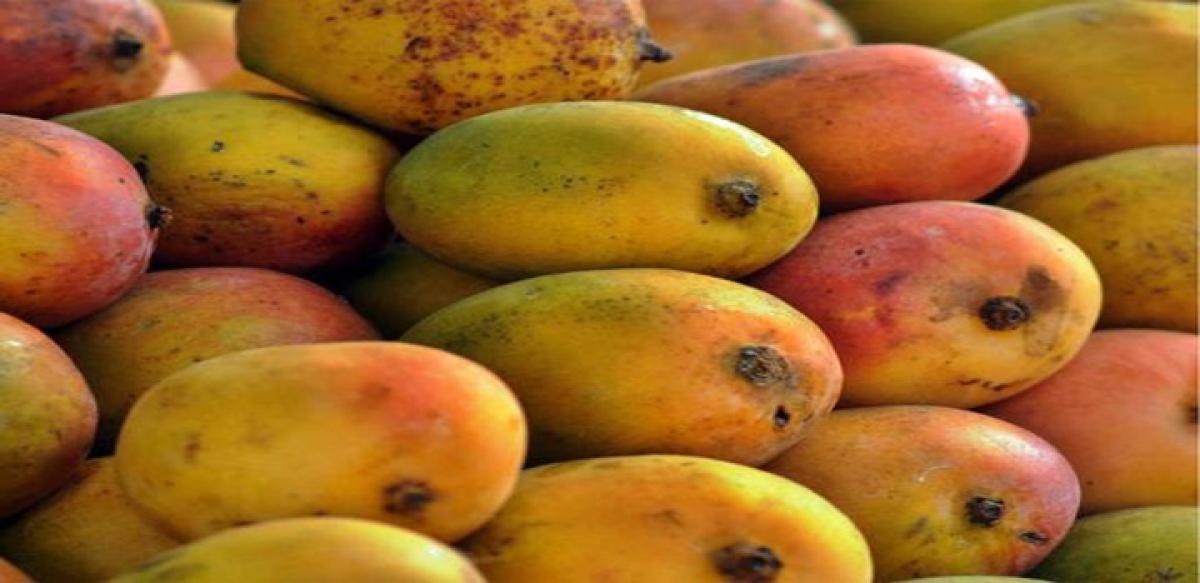Live
- Cops prohibit assembly of 5 or more near Group-II exam centres
- Avanthi, Grandhi quit YSRCP, lash out at Jagan
- Dharani portal services paused till Dec 16
- Komuravelli Mallanna Swamy Jatara from Jan 19
- Study tour for TG legislators soon
- State cabinet expansion by Dec 31: Ponguleti
- 2 Narayanites bag gold medals in IJSO-2024
- Jail superintendent suspended in ailing farmer handcuff incident
- CM Revanth orders probe into farmer’s handcuff incident
- Handcuffing of farmer after heart stroke draws BRS’ ire
Just In

With the rapid development of fruit trade, artificial ripening of fruits has been rising in East Godavari for some time. It is said that several whole sellers of climacteric fruits like mango, banana, papaya, sapota and custard apple instead of harvesting in a mature and unique condition by allowing them to ripen by nature release of hormone
Kakinada: With the rapid development of fruit trade, artificial ripening of fruits has been rising in East Godavari for some time. It is said that several whole sellers of climacteric fruits like mango, banana, papaya, sapota and custard apple instead of harvesting in a mature and unique condition by allowing them to ripen by nature release of hormone (ethylene) from the fruit are instead opting for artificial ripening methods practiced earlier by small traders through smoking and calcium carbide treatment.
- Fruits are put in enclosed chambers where large quantities of calcium carbide is put and water is sprinkled before sealing them
- Government of India has banned the use of calcium carbide for ripening of fruits under PFA Act 8-44 AA, 1954
- The Indian Medical Association , Kakinada chapter president Dr Ram Swaroop Jawaharlal warned that consumption of fruits which were artificially ripened leads to gastritis
Even traders are said to be opting for this process for lemons and goose berry as well. It is said that these sections are opting for this mode as they found natural ripening in some fruits to be a slow process, which leads to high weight loss. In this process, fruits are being commercially ripened with the banned chemical like calcium carbide which after reaction with water vapour present in the surrounding atmosphere releases acetylene gas. Some traders are ripening fruits like banana in enclosed chambers where large quantities of calcium carbide is put and water is sprinkled before sealing the chambers.
Though the released acetylene triggers ripening in fruits, it is also put in small packets in the fruit boxes and in some cases sprinkled onto the fruit surface. However, calcium carbide contains chemical impurities such as arsenic hydride and phosphorus hydride that are highly carcinogenic compounds. It is also said that improper use of calcium carbide can therefore cause chemical contamination of fresh produce.
Further, fruits so ripened develop attractive surface colour, are inferior in taste, flavour and spoil faster. Though the Government of India banned the use of calcium carbide for ripening of fruits under PFA Act 8-44 AA, 1954 the implementation seems to be a much neglected affair. The FSSAI which is the authority to check this practice is said to be facing shortage of staff.
With Mango season round the corner consumers are more worried as children and aged people opt for these fruits. The Indian Medical Association, Kakinada chapter president Dr Ram Swaroop Jawaharlal warned that consumption of fruits which are artificially ripened leads to gastritis and stomach diseases. In children it will have multiple effects. The government should strictly implement the act and strict vigil should be kept on such activities. Voluntary and service organisations should take the initiative on focusing this health hazard, Dr Jawahar observed.
When contacted, the Food Safety and Standards Authority of India (FSSAI) Assistant Food Controller and in-charge of six district regions Nageshwarayya said that during January and February they conducted raids at nine places in East Godavari district. These include Kakinada, Rajamahendravaram, Kothapeta Ravulapalem, Aamalapuram, Mandapeta and other places. "With the mango season round the corner we are keeping a close watch on this activity," he said. The shortage of inspectors to conduct frequent raids has been hampering our activity, he added.

© 2024 Hyderabad Media House Limited/The Hans India. All rights reserved. Powered by hocalwire.com







